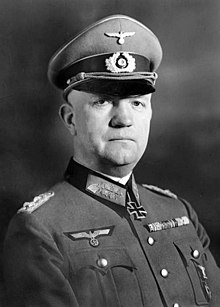Friedrich Fromm
| Friedrich Fromm | |
|---|---|

Generaloberst Friedrich Fromm
|
|
| Born | 8 October 1888 Berlin, Kingdom of Prussia, Germany |
| Died | 12 March 1945 (aged 56) Brandenburg-Görden Prison, Brandenburg an der Havel, Province of Brandenburg, Free State of Prussia, Nazi Germany |
| Allegiance |
|
| Service/branch | Army |
| Rank | Generaloberst |
| Commands held | Chef der Heeresausrüstung und Befehlshaber des Ersatzheeres |
| Battles/wars | World War I World War II |
| Awards | Knight's Cross of the Iron Cross |
Friedrich Fromm (8 October 1888 – 12 March 1945) was a German army officer. In World War II, Fromm was Commander in Chief of the Reserve Army (Ersatzheer), in charge of training and personnel replacement for the German Army, a position he occupied for most of the war. A recipient of the Knight's Cross of the Iron Cross, he was executed for failing to act against the plot of 20 July 1944 to assassinate Hitler.
Fromm was born in Charlottenburg. He served as a lieutenant during World War I.
At the beginning of the Nazi era, Fromm played an important role in the power structure of the regime: beginning in 1933, he was responsible for the human and material upgrade of the German army.
In 1939, Fromm became Chief of Army armour and commander of the Replacement Army (the Ersatzheer).
When Operation Barbarossa stalled outside of Moscow in December 1941 and the Russian counter-attack started, Hitler took direct command of the Army and re-organized the armed forces command structure. The Office of the Chief of Army Armament and the Reserve Army under Generaloberst Friedrich Fromm was created, subordinate to the commander in chief, army (head of the OKH, i.e. Hitler). Fromm had enough power at his disposal to control the German state because his position controlled army procurement and production and commanded all army troops inside Germany.
At the beginning of 1942 Fromm, apparently, recommended going over to the defensive for the entire year, because of exhausted army stockpiles and the diversion of production, after Barbarossa initial success in the summer of 1941.
Though he was aware that some of his subordinates—most notably Claus von Stauffenberg, his Chief of Staff—were planning an assassination attempt against Adolf Hitler, he remained quiet and agreed to have a part in it if he became a top official of the new government after the mutiny. He didn't have any direct involvement in the conspiracy. When the attempt to proceed with a mutiny on 15 July 1944 failed, Fromm refused to have any further part in it.
...
Wikipedia
